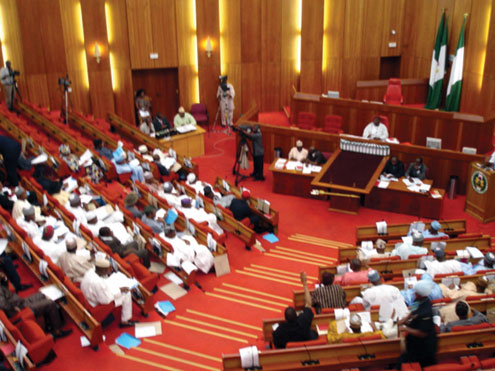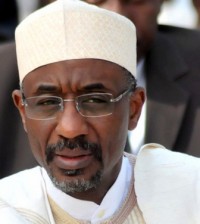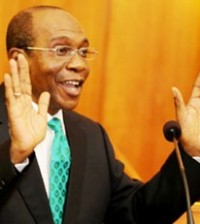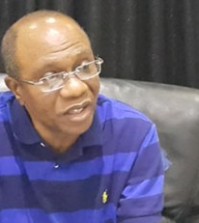Elections: Assessing CBN’s controlling policy on inflation
The benchmark lending rate was recently increased from 6.5 per cent to 7.5 per cent by the Monetary Policy Committee of the Central Bank of Nigeria. Experts say the increase will strengthen the value of the naira and control inflation, writes Ademola Alawiye.
For the second time this year, the Central Bank of Nigeria has raised the Monetary Policy Rate from 6.25 per cent last year to 7.5 per cent, in a bid to attack rising inflation and to address perceived increased spending in the economy during the April elections.
The CBN on Tuesday surprised stakeholders in the Nigerian economy by increasing the MPR by 100 basis points from 6.5 per cent to 7.5 per cent.
The MPR is the base rate at which the CBN lends to Deposit Money Banks.
The 12 members of the MPC during the meeting voted for an increase of the benchmark interest rate. While nine out of the 12 members agreed that the MPR be increased by 100 basis points, three others voted for a 50 per cent increase.
The Governor of the Central Bank of Nigeria, Mr. Lamido Sanusi, said after the MPC meeting that the increase would help check public spending ahead of the general elections next month.
He also said that the committee considered the country’s growth outlook in the near to medium term, but expressed concern over the heightened risk of inflation arising from the proposed high expenditure outlay of the Federal Government as contained in the 2011 budget.
This, he noted, was necessary, especially in the wake of the global food and energy crises.
He, however, stressed that the “proposed expenditure outlay negated the initial sentiment for fiscal retrenchment, which would have supported monetary policy effectiveness.”
Sanusi added, “The current fiscal stance is inconsistent with the objective of maintaining stability in exchange rates, prices and interest rates. The committee, therefore, believes that unless the fiscal stance is reversed, the economy would have to bear a high cost in terms of pressure on foreign reserves, high interest rates and higher level of inflation.”
He said that the need for tightening needed to be appreciated, since the reforms in the banking sector had not been completed, adding that a number of banks had signed memoranda of understanding with core investors.
Meanwhile, inflation rate responded to the previous drop in MPR, dropping by one per cent to 11.1 per cent in February, from 12.1 per cent recorded in January.
The National Bureau of Statistics, however, said in a statement that the year-on-year average consumer price level as at January 2011 for urban and rural dwellers rose by 7.9 and 15.6 per cent respectively.
The MPC had, at its meeting on January 25, raised the MPR by 25 basis points from 6.25 per cent to 6.50 per cent.
Analysts, however, believed that the move would make the naira more stable, saying that it would reduce the pressure on exchange rates.
Prior to the MPC’s meeting on Tuesday, the naira had been falling against the United States dollar on the inter-bank market, as demand continued to outstrip supply at the CBN’s bi-weekly auction.
An investment research analyst with Afrinvest West Africa, Mr. Victor Ndukauba, said that the speculative demand for the dollar observed in recent times could be partly attributed to the excess liquidity in the system due to a low interest rate environment.
Ndukauba said, “This has placed undue pressure on the naira. On the one hand, the hike in the MPR is expected to reduce liquidity-induced dollar demand while on the other hand, higher interest rates will further reduce the propensity to hold dollar position at the expense of the domestic currency. This should help ease the pressure on the naira.”
The Regional Head, Research, Africa, Standard Bank Group, Ms. Razia Khan, said that the increase in MPR would help the naira to be more stable.
She told our correspondent, “As a result of this move by the apex body, the rate on the CBN’s standing deposit facility rises to 5.5 per cent from 4.5 per cent previously. If banks are paid more on their excess liquidity, they don’t need to use it to fund foreign exchange purchases.
“The cost of borrowing in naira to fund demand at the forex auction rises, so either way, the naira is stabilised and this should help dampen at least some inflation pressure.”
Also, the Chief Executive Officer, Financial Market Dealers Association of Nigeria, Mr. Wale Abe, had also told our correspondent that the action was expected.
On the implication on naira, he said, “This will make naira to be expensive because, to borrow naira will become more expensive. Naira pressure will rise while the pressure on dollar purchase will reduce, it will affect exchange rates. Also, inter-bank rates will rise because liquidity will drop.”
Khan added in a statement that the announcement of the passage of an expansionary fiscal budget for 2011 appeared to have been the determining factor.
She said, “With the MPC voting unanimously to tighten rates, the magnitude of fiscal expenditure, pretty much unchanged from last year’s dramatically elevated levels, certainly required an offsetting policy response. Inflation risks in Nigeria are already high and moving higher. Imported fuel is a contributor, and recent pressure on the naira provided plenty of reason to be concerned.
“With the corridor around the MPR unchanged at +/-200Bps, the rate on the standing deposit facility now moves up to 5.5 per cent. The rate on the CBN’s standing lending facility is 9.5 per cent, which is higher, but of course still less than the prevailing inflation trend.
Sanusi had said in an interview that the recent weakness in the naira was temporary and natural ahead of next month’s elections, adding that the apex body would try to maintain stability in the exchange rate.
The CBN governor said that the guarantee on inter-bank transactions and foreign credit lines would be extended by three months from June 30 to September 30 this year, as part of measures aimed at ensuring stability in the inter-bank market.
He also said that the committee noted the re-emergence of demand pressures in foreign exchange markets, adding that the situation, if left unchecked, could have serious implications on the economy.
He, however, said that owing to the tightening, the naira might return to equilibrium within the next four weeks, as those who speculated with borrowed funds would have to do these at a higher cost.
The naira, however, firmed against the US dollar as inter-bank lending rates rose on Wednesday. The currency, which eased to its weakest level against the dollar in 18 months last week, firmed to trade at N154.50 to a dollar from N154.90 at the close of business on Tuesday.
Source : Punch








